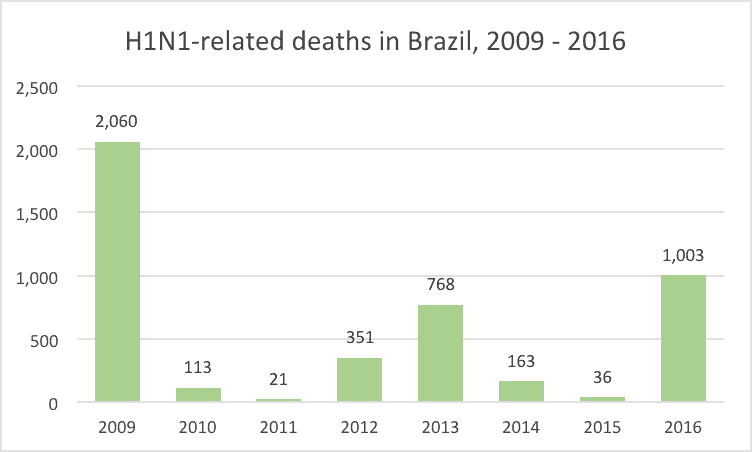Swine Flu Adds to Brazil’s Zika Worries
In 2009, a major worldwide H1N1 flu pandemic killed at a minimum of around 18,500 people in 214 countries. The number is regarded as well below the true total, mainly because many people who die of flu-related causes are not tested for the disease. In Brazil, there were 2,060 confirmed deaths.
Since then, a vaccine for the disease, which is also known as “swine flu,” has been developed and has been distributed in Brazil. Despite that, another swine flu outbreak is currently happening amidst Brazil’s economic problems, political crisis and the Zika outbreak. Health officials have reported 1,003 deaths so far this year from swine flu. That’s the most fatalities linked to the disease in Brazil since 2009. (There were only 36 H1N1 fatalities in 2015 and 163 in 2014.)

The Olympics will be held Aug. 5-21 in Rio de Janeiro, where there have been 150 cases and 44 deaths linked to the virus H1N1 this year. The virus has affected nearly all of Brazil’s 27 states, but is particularly concentrated in the southeast region, where 2,606 infections and 540 deaths have been reported. São Paulo leads all states with 402 deaths. In addition to the fatalities by H1N1 influenza, an additional 93 deaths have reportedly been caused by other types of influenza.
H1N1 spreads between people in the same way that seasonal flu virus spreads, and a person infected with H1N1 is contagious for one day prior to and for about a week after the onset of symptoms.
According to Brazil’s Ministry of Health, more than 47.6 million people were vaccinated in a national campaign against influenza. That includes 95.5 percent of the target audience: children 6 months to 5 years old, pregnant women, women who gave birth within the past 45 days, the elderly, health professionals, indigenous people and people with chronic diseases and other diseases that leave people immunocompromised.
But not everyone can be given the vaccine. The vaccine virus is grown in eggs, because the flu virus grows well in them, putting people who are allergic to eggs at risk for allergic reactions to any influenza vaccine. And only five companies manufacture the H1N1 vaccine – MedImmune LLC, CSL Limited, ID Biomedical Corporation of Quebec, GlaxoSmithKline and Sanofi Pasteur – and the global demand for the vaccine is greater than these companies can supply.
As mentioned earlier, Brazil is already dealing with a Zika virus epidemic, an illness transmitted by the Aedes aegypti mosquito with symptoms similar to dengue. Zika can cause infected pregnant women to bear children with microcephaly, a defect that causes babies to have abnormally small heads and deformed brains. As of mid-June, Brazil had registered 1,616 microcephaly cases.
Even though more than 230 prominent doctors, experts and professors from 40 countries, in an open letter to the World Health Organization (WHO), strongly advised that the upcoming Olympics be postponed or moved, both the Brazilian Ministry of Health and WHO seem to agree that the Olympics will happen as planned. They don’t anticipate the epidemic will affect the half a million tourists expected to attend the Olympics because temperatures are expected to cool, decreasing mosquito activity. They are, however, advising travelers to keep themselves informed about health risks in the areas they plan to visit.
That leaves epidemiologists and infectious disease modelers to argue over the potential for some of the athletes and fans to become infected with the Zika virus in Rio and return to their respective countries, where both local Aedes mosquitoes and sexual transmission could start new outbreaks. (A returning tourist who has been infected by the virus can be bitten by an Aedes mosquito in his country and potentially spread Zika.)
Meanwhile, the Centers for Disease Control and Prevention recommends that travelers to Brazil be up to date on routine vaccines, which may include hepatitis A, typhoid, hepatitis B, yellow fever and rabies, depending on the area visited. They are not, however, recommending that Olympic athletes and fans be vaccinated for H1N1.
Olympism “seeks to create a way of life based on the joy of effort, the educational value of good example, social responsibility and respect for universal fundamental ethical principles.” Is it ethical or socially responsible to proceed with the Olympics and potentially infect half a million people? Is it ethical or socially responsible to transform Olympic fans and athletes into potential spreaders of disease?
Changing the Olympic schedule would cost money, for sure, and businesses and stakeholders might even go bankrupt. But if the schedule isn’t changed, there could be global health incidents and victims left to suffer the consequences, possibly for life.
Will this H1N1 outbreak – on top of the Zika epidemic – make WHO change its mind? Both the H1N1 and Zika outbreak in Brazil are dynamic. Health authorities will continue to monitor the situation and will adjust their recommendations as needed. We’ll have to wait and see.
Dr. Melvin Sanicas is a global health fellow and program officer at the Bill & Melinda Gates Foundation.
Photo of H1N1 vaccine by Agência Brasília via Flickr.
- Categories
- Health Care
